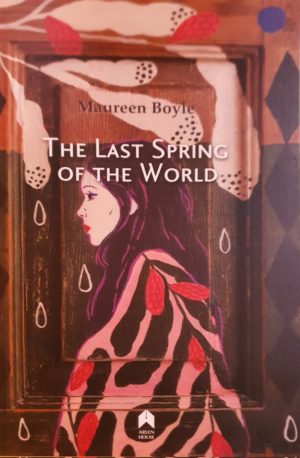The Last Spring of the World
by Maureen Boyle
reviewed by Csilla Toldy
In The Last Spring of the World, her second collection with the Irish feminist publisher Arlen House, Maureen Boyle interweaves autobiographical prose with long poems in a volume full of insight into peculiarly Irish attitudes toward life and death. As with her first collection, The Work of a Winter, where she took on the voices of forgotten women and men, here Boyle bases her themes on her own experiences and on the lives of historical figures.
Boyle was born and raised near Strabane, a town said to have been the most bombed during the Troubles in Northern Ireland. Yet the long poem “Strabane” goes back much further in time, exploring Boyle’s Catholic Scots ancestry. The language of place-names—Gweedore, Glenties, Crolly—colors her melodic verse, which follows the rhythm of the River Finn. Her childhood memories conjure up an enviably peaceful place in harmony with nature, but over the course of this long sequence, tragedy strikes and the bombings begin. The idyllic childhood is destroyed and family roles are reversed. Now the child worries for her parents’ safety:
On the news we heard stories of people
shot through their doors,
and when a traveller’s car broke down
and he rang our bell in the night
I’d lie in bed willing my father not to respond,
imagining the figure on the other side
shooting through the glass.
No wonder that, like many of her generation, Boyle moved to England to live and study for a period. The salmon is a symbol of knowledge in Irish folklore, and, in the last section of the poem, the poet uses the salmon’s return as a metaphor for her homecoming:
And so they come back
year-after-year if they survive the ocean winters
swimming against the current,
the fresh water washing off silvery camouflage
that kept them safe in the sea
Whether as a pretext for political conflicts or as a source of comfort and tradition, religion still looms large in modern Ireland. In Boyle’s capable hands, mysticism and religion imbue Boyle’s work with a shimmering beauty. In the poem “Crossing the Alps,” Boyle recalls childhood play as
… a way to prepare us
for the real danger that lay
always, just beyond our gates,
our ages and our lives
For fans of Boyle, this poem foreshadows the events of the prose memoir Luscus, winner of the 2013 Fish Short Memoir Prize, which is about losing sight in one eye as a child but also about learning to see with the help of one Mr Lennox. As in Luscus, life and death go hand in hand in The Last Spring in the World. The long poem sequence “Bypass” tells the story of Boyle’s father’s open-heart surgery; in the poem “The House at Christmas,” the poet evokes beautiful cadences that are by turns melancholy and exquisitely visual.
Its wide dark eyes –
the picture windows of a ‘60s bungalow –
reflect rooms in black lakes
cold and mirrored as though slick
with tears and ice
“First Time” is another long poem about becoming a woman, set within a unique historical context. Due to the dominance of the Catholic Church, using contraception was illegal for unmarried couples in Ireland until February 1985. Therefore, the preparations and the secretive nature of the business of losing one’s virginity is a touching tale of history as well as the coming of age of a young woman. Religion dominates “Box Room,” another short autobiographical prose piece retelling a sad story of love with a man who narrowly escapes becoming a priest.
Love comes at a high price in these stories and poems. Boyle, who was taught by Catholic nuns at a grammar school, is fascinated by the history of religion, both monasticism and mysticism and the overlap of Catholicism to Protestantism during the English Renaissance. Her well-researched sequence, “The Nunwell Letter April 1612,” takes readers to the Isle of Wight, where John Donne’s wife Anne More stayed and gave birth to a stillborn child. Boyle says that “this poem is an attempt to fill in the silence that is left by Ann More in the literary record since no portrait or writing of her survives. It is an answer to Donne’s ‘Valediction.’”
Taking on the voices of characters in the first person has always been Boyle’s forte. In her long poem “The Work of a Winter – St Antony’s Leuven, 1643,” included in the collection of the same title, she took on the voice of Micheal O’Clery, the Franciscan monk who was one of the authors of The Annals of the Four Masters, a chronicle of medieval Irish history. By mixing meticulous research with an intimate voice, Boyle reimagines historical figures yet again in The Last Spring of the World, making for a wise collection of poems on Irish identity and womanhood.
Published on March 28, 2023

